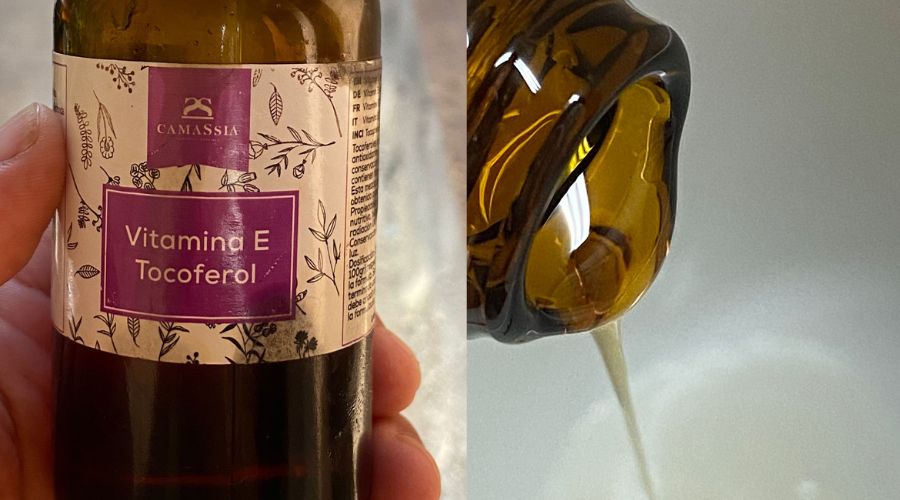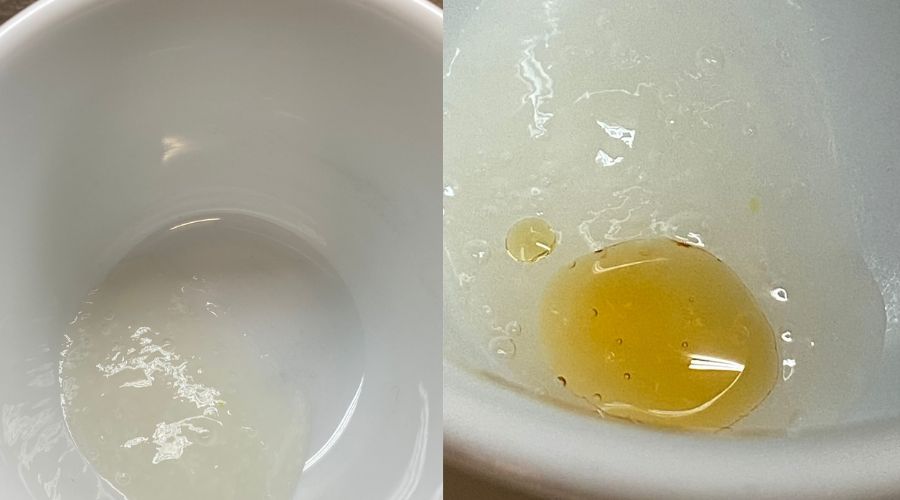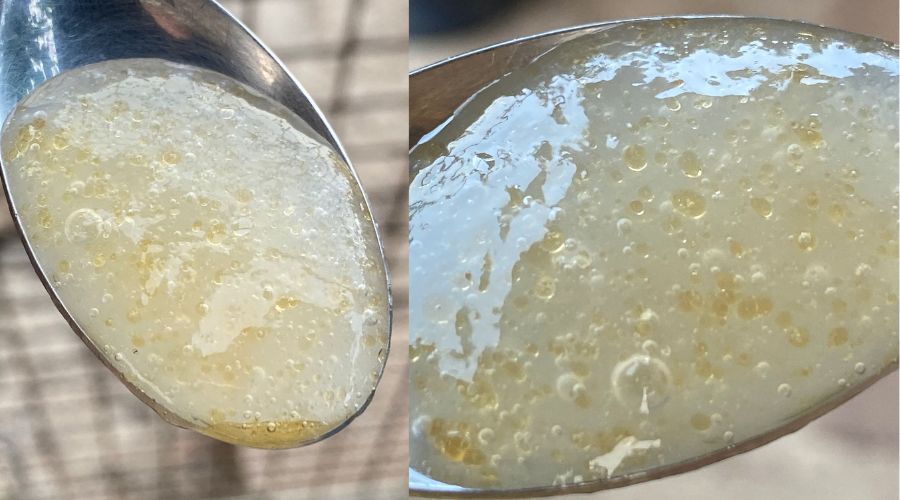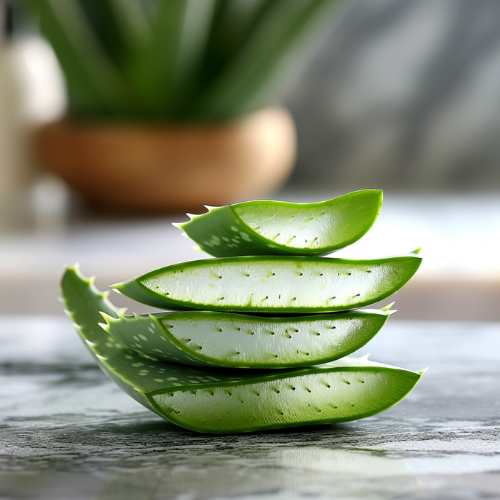Aloe Vera with Vitamin E for Face: Radiant Skin Benefits
Aloe vera with Vitamin E for the face is a transformative solution for those combating dull, tired-looking skin.
Beyond addressing dullness and fatigue, this potent duo:
- moisturizes and revitalises the complexion
- protects against sun damage
- acts as an effective anti-ageing treatment
- alleviates inflammation
- boosts skin elasticity
- and ensures a radiant, even skin tone
For years, I’ve been incorporating Aloe vera into my skincare routine (which I grow myself). I also add Vitamin E, a potent antioxidant, to all my DIY skincare products, creating a powerful blend.
Why Aloe vera? Aloe vera is renowned for its hydrating and soothing properties, making it a go-to ingredient for achieving a calm and moisturised complexion.
Why Vitamin E? Vitamin E acts as a potent antioxidant, protecting the skin from environmental damage while promoting healing and rejuvenation.
Ready to learn more about this game-changing skincare solution?
Key Takeaways
- Powerful Duo for Skin Health: Aloe vera combined with vitamin E offers a potent solution for various skin concerns, including hydration, inflammation, scarring, and ageing.
- Versatile Application: You can create DIY face masks, serums, and creams using aloe vera and vitamin E, tailored to your skincare needs.
- Natural and Effective: Both aloe vera and vitamin E are natural ingredients, revered for their skin-enhancing benefits.
- Protection and Healing: The combination not only hydrates but also protects against sun damage and promotes skin healing.
- Safety First: Always conduct a patch test before applying any new skincare mixture to ensure you don’t have an allergic reaction.
- Quality Matters: When choosing vitamin E, opt for natural forms like d-alpha-tocopherol for better skin absorption and efficacy.
- Storage and Shelf Life: Ensure your DIY mixtures are stored in clean containers, preferably in cool places, to maintain their benefits.
Benefits of Aloe Vera with Vitamin E for the Face
Aloe vera with vitamin E hydrates and moisturizes the skin, reduces inflammation and redness, promotes healing and reduces scars, acts as an anti-ageing treatment, and protects against sun damage.
- Hydrates and Moisturizes the Skin:
- Aloe vera combined with Vitamin E has been shown to deeply moisturise the skin, making it feel soft and look bright. The presence of Vitamin E in Aloe vera leaves contributes to its moisturizing properties – source.
- Reduces Inflammation and Redness:
- Aloe vera and Vitamin E have soothing properties that calm irritated skin and alleviate redness. Aloe vera contains natural compounds like glycoproteins that help reduce inflammation, while Vitamin E has antioxidant properties that can protect the skin from free radicals causing redness – source.
- Promotes Healing and Reduces Scars:
- Aloe vera contains enzymes that help repair damaged skin cells, while Vitamin E nourishes and supports the growth of new healthy skin tissue. Together, they can improve the appearance of scars and help them fade over time – source.
- Acts as an Anti-Aging Treatment:
- Aloe vera stimulates collagen production, which improves skin elasticity and reduces wrinkles. Vitamin E protects against free radicals that cause premature ageing. A study also found that a biocellulose mask containing Aloe vera essence combined with Vitamin E provided a beneficial anti-ageing activity –source.
- Protects Against Sun Damage:
- Both Aloe vera and Vitamin E have antioxidants that help shield the skin from harmful UV rays. These antioxidants can neutralise free radicals caused by sun exposure, reducing the risk of sunburn and premature ageing – source.
How to Use Aloe Vera with Vitamin E for the Face and Recipes
How to Mix Aloe Vera with Vitamin E
Ingredients:
- 2 tablespoons of pure Aloe Vera gel
- 1 Vitamin E capsule
Instructions:
- Cut open the Vitamin E capsule and squeeze out the oil into a small bowl.
- Add the pure Aloe Vera gel to the bowl.
- Mix the two ingredients together until well combined.
- Apply a few drops of the serum to your clean face, gently massaging it in.



Find a fun variety of ways to incorporate aloe vera and vitamin E into your skincare routine below.
Each method targets different skincare needs and can be chosen based on individual preferences.
Remember to always do a patch test before trying out any new skincare product or method.
1. Aloe Vera and Vitamin E Serum
This serum is ideal for all skin types, especially those looking for an intensive night treatment. Aloe vera ensures deep hydration, while vitamin E offers antioxidant protection against free radicals. The optional addition of essential oils like lavender or tea tree can provide added benefits. Lavender is known for its calming properties, making it great for sensitive or irritated skin. On the other hand, tea tree has antibacterial properties, making it suitable for acne-prone skin. Regularly using this serum can help achieve a rejuvenated and refreshed complexion by morning.
- Ingredients:
- 2 tablespoons of pure aloe vera gel
- 2 vitamin E capsules
- A few drops of essential oil (like lavender or tea tree, optional for added benefits and fragrance)
- Method:
- Extract the aloe vera gel into a bowl.
- Cut open the vitamin E capsules and squeeze out the oil into the bowl.
- Add a few drops of essential oil if desired.
- Mix well until you get a smooth consistency.
- Store in a clean container.
- Apply a few drops of this serum to your face every night before bed. No need to rinse.
2. Aloe Vera and Vitamin E Day Cream
This day cream is perfect for normal to dry skin types. The combination of aloe vera and vitamin E ensures that the skin remains moisturized throughout the day. By integrating it with your regular day cream or moisturizer, you’re enhancing its benefits. Vitamin E provides a protective barrier against environmental stressors, while aloe vera ensures the skin remains supple and hydrated. It’s a great way to start the day with a moisturized and protected complexion.
- Ingredients:
- 1 tablespoon of aloe vera gel
- 1 vitamin E capsule
- 1 tablespoon of your regular day cream or moisturizer
- Method:
- In a bowl, combine your regular day cream or moisturizer with aloe vera gel.
- Add the oil from the vitamin E capsule.
- Mix well.
- Apply this mixture in the morning after cleansing your face.
3. Aloe Vera, Vitamin E, and Agave Syrup Face Pack
This face pack is particularly beneficial for those with dry or mature skin. Aloe vera provides hydration and soothes any inflammation or redness. Vitamin E offers antioxidant protection, protecting the skin from environmental aggressors. Agave syrup, being a natural humectant, draws moisture to the skin, ensuring deep hydration. Moreover, agave syrup is known for its skin-softening properties, making it great for those looking to achieve a supple and smooth complexion. This face pack deeply moisturises and provides essential nutrients, ensuring a radiant and youthful appearance. Regular use can lead to hydrated, soft, and glowing skin.
- Ingredients:
- 2 tablespoons of aloe vera gel
- 1 vitamin E capsule
- 1 tablespoon of organic agave syrup
- Method:
- Combine aloe vera gel and agave syrup in a bowl.
- Add the oil from the vitamin E capsule.
- Mix until you get a smooth paste.
- Apply this pack to your face and leave it on for 20 minutes.
- Rinse off with lukewarm water.
4. Aloe Vera, Vitamin E, and Rose Water Toner
This toner is suitable for all skin types but is especially beneficial for sensitive or irritated skin. Rose water is known for its calming and pH-balancing properties. When combined with the hydrating benefits of aloe vera and the protective properties of vitamin E, it creates a toner that refreshes the skin and ensures it’s well-hydrated and protected from environmental stressors. Regular use can lead to a balanced, refreshed, and glowing complexion.
- Ingredients:
- 1 cup of rose water
- 2 tablespoons of aloe vera gel
- 2 vitamin E capsules
- Method:
- In a spray bottle, pour in the rose water.
- Add aloe vera gel.
- Cut open the vitamin E capsules and squeeze out the oil into the bottle.
- Shake well to mix.
- Spray this toner on your face after cleansing and before moisturizing.
Interesting scientific reading: Formulation of a biocellulose mask containing the essence of Aloe vera (L.) Burm.f combination with vitamin E as anti-aging
I can’t begin to express how thrilled I am to see more and more people embracing the magic of aloe vera and vitamin E. This journey is deeply personal to me. In my own garden, I nurture over 20 aloe vera plants, each one cared for with love and dedication. I’ve integrated this natural wonder into my daily routine, and the results speak for themselves. My skin has never looked or felt better! From firsthand experience, I can confidently say that this combination truly works. Every time someone shares their positive experience with this mix, it warms my heart, knowing that a piece of nature I cherish so much is making a difference in others’ lives too.
Questions You Might Be Asking Yourself
AFFILIATE COMMISSION DISCLAIMER: I may earn a commission from affiliate links in this article at no extra cost to you.
Which Aloe Vera Should I Use?
When it comes to aloe vera, you have a couple of options. You can either use gel extracted directly from the aloe vera plant or purchase store-bought aloe vera gel. Using gel from the plant (this is what I do) ensures you’re getting the most natural and unprocessed form, which can be ideal if you’re looking for that freshness and the nutrients “there and then”. However, store-bought gels often come with added preservatives to increase shelf life, so it’s essential to choose one that’s labelled as “pure” or “organic” to ensure minimal additives. Here’s my recommendation. If you’re making skincare products in larger batches or for extended use, store-bought gel might be more convenient due to its longer shelf life.
Understanding Your Vitamin E Choices
Vitamin E typically comes in two main forms for skincare: capsules and bottled oil (I use the latter). Capsules are perfect for small, one-time-use recipes as you can easily cut them open and extract the precise amount needed. They ensure freshness as each capsule is sealed, preserving the oil’s potency. On the other hand, bottled vitamin E oil is more practical for larger batches or if you’re making products for friends and family, as it allows for easier measurement and mixing. Always opt for a high-quality product when selecting vitamin E, whether in capsules or bottled form. Look for labels that indicate “natural” or “d-alpha-tocopherol” as these are indicators of a higher quality product, as opposed to the synthetic “dl-alpha-tocopherol.”
D-alpha-tocopherol is the natural form of vitamin E derived from plant sources, while dl-alpha-tocopherol is its synthetic counterpart produced in a laboratory.
How Exact Do I Need to Be with Measurements?
Aloe vera and vitamin E are quite forgiving.
While the recipes provide specific measurements to ensure consistency and effectiveness, a little more or less of one ingredient won’t harm your skin.
However, starting with the recommended amounts and adjusting based on your skin’s needs and reactions is always a good idea.
Remember, everyone’s skin is different, so finding the balance that works best for you is essential.
Does the Vitamin E Mix Smoothly with Aloe Vera or Does It Form Lumps/Clumps?
When combining vitamin E oil with aloe vera gel, you might notice that the two don’t immediately blend seamlessly.
Vitamin E, being an oil, has a different consistency than the water-based aloe vera gel.
However, thorough mixing can combine the two into a smoother consistency.
It’s essential to ensure you mix them well to avoid any lumps or clumps. Using a small whisk or even a fork can help achieve a more uniform mixture.
If you notice any persistent clumps, it’s likely due to the aloe vera gel’s specific texture or the vitamin E oil concentration. Don’t worry about it. I used to worry and now I understand it doesn’t matter!
Learn to Assess Quality!
Quality is paramount when choosing ingredients for skincare. For aloe vera, ensure no unnecessary additives, colours, or fragrances exist, especially if you opt for store-bought versions. For vitamin E, a darker-coloured oil generally indicates a higher quality as it contains more of the active ingredient. Always read labels, check for certifications, and, if possible, opt for products that have transparent sourcing and manufacturing practices. Investing in quality ingredients ensures better skincare results and peace of mind.
Tips, Tricks & Hacks
- Ice Cube Soothers: Freeze a mixture of aloe vera gel and vitamin E oil in ice cube trays. Whenever your skin feels irritated or sunburned, pop out a cube and gently rub it over the affected area for instant relief.
- Night-time Lip Treatment: Mix a small amount of aloe vera gel with a few drops of vitamin E oil. Apply this blend to your lips before bed for a deeply moisturising overnight treatment.
- Boost Your Regular Products: Add a few drops of vitamin E oil to your daily moisturiser or body lotion. Combine this with a bit of aloe vera gel for an enhanced hydrating experience.
- DIY Vitamin E Hair Serum: Mix vitamin E oil with aloe vera gel and apply it to the ends of your hair. This can help prevent split ends and give your hair a healthy shine.
- Under-eye Treatment: The gentle combination of aloe vera and vitamin E can be applied under the eyes to reduce puffiness and dark circles. Remember to patch-test first!
- Natural Makeup Remover: A blend of aloe vera gel and vitamin E oil can act as a gentle, natural makeup remover, especially for stubborn eye makeup.
- Post-shave Soother: If you experience irritation after shaving, apply a mixture of aloe vera and vitamin E to calm the skin and reduce redness.
- Enhanced Healing for Minor Cuts and Scrapes: Due to their combined healing properties, applying a blend of aloe vera and vitamin E to minor skin abrasions can speed up the healing process.
- Store in the Fridge: For an extra refreshing experience, especially in the summer, store your aloe vera and vitamin E blend in the refrigerator. The coolness can help reduce skin inflammation and provide a refreshing sensation upon application.
- Natural Exfoliant: Mix aloe vera gel, vitamin E oil, and a bit of brown sugar for a gentle face scrub. The sugar exfoliates, while aloe and vitamin E soothe and nourish the skin.
Precautions and Side Effects
Take caution when using A vera with vitamin E on your face, as allergic reactions can occur. Always perform a patch test before applying the mixture to your entire face, and discontinue use if you experience any adverse effects.
Additionally, keep in mind that vitamin E can increase sensitivity to sunlight, so be sure to protect your skin when exposed to the sun after using this combination.
Just because a product is natural doesn’t mean it won’t cause allergic reactions; everyone’s skin is different, and what works for one person might irritate another. Always patch-test new products to ensure they’re suitable for your skin type! Read below for allergic reactions.
Allergic reactions
Some people may have allergic reactions to aloe vera with vitamin E for the face. This can include itching, redness, or a rash on the skin. Doing a patch test before using any new product containing these ingredients is important to see if you have any adverse reactions.
If you experience any discomfort or irritation, discontinue use immediately and consult a healthcare professional if needed.
Sensitivity to sunlight
Using aloe vera with vitamin E can provide a layer of protection against the harmful effects of UV rays due to their combined antioxidant properties.
However, it’s essential to note that while they offer some protection, they shouldn’t replace your regular sunscreen.
Patch test before use
Before using aloe vera with vitamin E on your face, it is important to do a patch test. This involves applying a small amount of the mixture to a small area of skin and waiting for 24 hours.
If there are no adverse reactions such as redness, itching, or swelling, then it is safe to use on your entire face.
Patch testing helps identify any potential allergies or sensitivity to the ingredients and ensures that you can enjoy the benefits of this natural remedy without any harmful side effects.
Storage
When it comes to DIY skincare products, especially those made with natural ingredients like aloe vera and vitamin E, understanding their storage and shelf life is crucial to maintain their efficacy and ensure skin safety.
Aloe Vera and Vitamin E Serum:
- Refrigerated: This serum can be stored in the refrigerator for up to 3 weeks. The cool environment not only extends its shelf life but can also provide a soothing effect upon application.
- Room Temperature: If stored at room temperature, it’s best to use the serum within 1-2 weeks. Always ensure the container is sealed tightly and kept away from direct sunlight.
Face Packs and Creams:
- Refrigerated: Face packs, especially those mixed with perishable ingredients, should ideally be used immediately. However, if refrigerated, they can last for up to a week.
- Room Temperature: It’s recommended to use these immediately after preparation to ensure maximum benefits and avoid any bacterial growth.
Toner Mixtures:
- Refrigerated: Toners can be stored in the refrigerator for up to 2 weeks.
- Room Temperature: If kept at room temperature, use within a week and ensure the container is sealed tightly.
To ensure the purity and safety of your DIY products, always utilise clean utensils and containers during preparation and storage. I personally recommend sterilising them with 70% degree alcohol to ward off any potential contamination effectively.
Conclusion

In conclusion, using aloe vera with vitamin E for the face can provide many benefits. It keeps the skin hydrated, reduces redness and inflammation, helps heal scars, fights signs of aging, and protects against sun damage.
By incorporating this natural remedy into your skincare routine, you can achieve healthier and more radiant-looking skin.
FAQs
1. How does aloe vera with vitamin E benefit the face?
Aloe vera with vitamin E can moisturize and nourish the skin, promote healing of acne or scars, reduce inflammation, and improve overall skin health.
2. Can I use pure aloe vera gel instead of aloe vera with vitamin E?
Yes, pure aloe vera gel can also provide similar benefits for the face. Adding vitamin E may enhance its antioxidant properties but is not necessary.
3. How do I use aloe vera with vitamin E on my face?
Apply a small amount of aloe vera with vitamin E to your clean face and gently massage it into the skin until absorbed. It can be used as a moisturizer or spot treatment for specific concerns.
4. Are there any potential side effects of using aloe vera with vitamin E on the face?
While rare, some people may experience allergic reactions or skin irritation when using products containing aloe vera or vitamin E. It’s advisable to patch test before applying it to larger areas of the face.
References
- K. Motwani, Vandana Gupta. Nano-Transfersomes of Vitamin-E and Aloe-Vera for The Management of Psoriasis. Available from: PDF. 2022 Oct 31.
- Vaishnavi S. Chaudhari -, Shubham P. Jaiswal -, Sanjana S. Nagalkar -, Dhanashree K. Pawar -. Formulation and Evaluation of Herbal Moisturizer. Available from: PDF. 2023 Apr 24.
- Ariyanti, Eni Masruriati, Haini Santi, D. Sulistyowati. Formulation stability analysis aloe vera leaf extract gel and shell shell collagen. Available from: PDF. 2022 Apr 13.
- Raissa Fitri, H. Syahputra, N. Nasri, V. E. Kaban, Zulmai Rani. Formulation of a biocellulose mask containing the essence of Aloe vera (L.) Burm.f combination with vitamin E as anti-aging. Available from: PDF. 2022 Dec 30.
